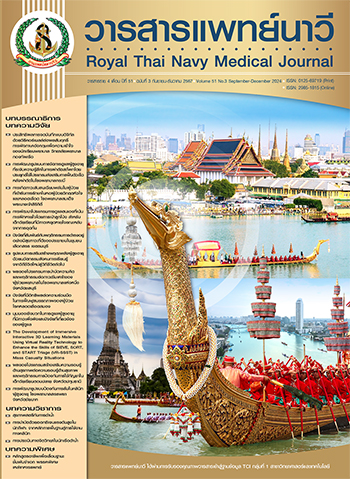The Active Aging Promoting Model of the Elderly by Social Learning Innovation from the New Normal toward the Next Normal Era
Main Article Content
Abstract
This study is an advanced mixed method research with explanatory sequential design (convergent parallel design) was divided into 3 phases: (1) Quantitative research to study the factors affecting the empowerment of the elderly; (2) Qualitative research to develop a model for empowering the elderly with social learning innovation from the new way to the next way; and (3) Quantitative research to evaluate the results of using the model for empowering the elderly with social learning innovation from the new normal toward the next normal era, and compare the behavior for empowering the elderly before and after using the model. The sample consisted of 295 elderly people aged 60 years and over. Data were collected by questionnaire according to the framework of the active aging concept and social learning as well as stimulating the learning skills of the elderly by Appreciation Influence Control (AIC). Data were analyzed using descriptive statistics, multiple regression analysis (Stepwise), and content analysis then model creation and testing and compared the mean scores of the behavior for empowering the elderly before and after using the model with paired sample t-test.
The research results found that elderly behavior under active aging from the new normal toward the next normal era, the average of participation in all 3 areas were at the high level (Mean = 3.70, SD = 0.44). The factors affecting the strengthening of the elderly's behavior were participation in planning and decision making, participation in practice, and participation in receiving benefits. Health promotion behavior to become active elderly (good health and participation in society), and occupation (pensioners or retired person) were predicted jointly at 54.5 percent. The active aging promoting model of the elderly by social learning innovation from the new normal toward the next normal era had 4 components including: (1) health knowledge in all dimensions; (2) perception of themselves before and after enhancement; (3) protection from social network threats and online media; and (4) network partners, caregivers and elderly coordinator under the name “Wiangthakan Aui Model”. After the trial of the model, it was found that the elderly had good health behaviors, participated in activities under the school club for the elderly, and had more security and stability for living in the next normal era of life.
Article Details

This work is licensed under a Creative Commons Attribution-NonCommercial-NoDerivatives 4.0 International License.
References
Foundation of Thai Gerontology Research and Development institute (TGRI). Situation of the Thai older persons 2020. Nakhon Pathom: Institute for Population and Social Research, Mahidol University; 2021.
World Health Organization. World report on ageing and health 2015. [Internet]. [cited 2023 November 12]. Available from: https://www.who.int/ageing/events/world-report-2015-launch/en/.
World Health Organization. Active ageing: policy framework 2002. [Internet]. [cited 2023 November 12]. Available from: https://extranet.who.int/agefriendlyworld/wp-content/uploads/2014/06/WHO-Active-Ageing-Framework.pdf.
Weston T, Chutintaranond T. Crisis communication strategies of the Center for Situation Administration on the outbreak of Coronavirus disease 2019 (COVID-19). Journal of Communication and Management NIDA (e-Journal) 2022;8(3):1-16. (in Thai).
Amornkitpinyo P. Social innovation for quality of life. Journal of Innovation in Educational Management and Research 2022;4(2):279-86. (in Thai).
Luszczynska A, Schwarzer R. Social cognitive theory. Fac Health Sci Publ 2015;225
Cahapay MB. Navigating the post-COVID-19 era of ‘Next Normal’in the context of Philippine higher education. Asia-Pacific Journal of Educational Management Research 2021 [Internet]. [cited 2023 November 12]. Available from: https://ssrn.com/abstract=3791769.
Wanichbancha K, Wanichbancha T. Using SPSS for Windows to analyze data. 27th ed. Bangkok: Samlada: 2016. (in Thai).
Likert R. New patterns of management 1961. [Internet]. [cited 2023 November 12]. Available from: https://psycnet.apa.org/record/1962-05581-000.
Fisher RA. Contributions to mathematical statistics 1950. [Internet]. [cited 2023 November 12]. Available from:https://psycnet.apa.org/record/1951-01390-000.
Chuenram K. Developing a model for self-health care in patients with insulin-independent diabetes at Sukirin hospital using participatory planning (AIC) techniques. [Master’s Thesis, Faculty of Science Technology and Agreculture]. Yala Rajabhat University 2016. (in Thai).
Permpool P. Developing the vitality of the elderly through integrated group consultation using existential theory as a base. [Doctoral Dissertation, Faculty of Education]. Burapha University, 2020. (in Thai).
Bowling A. Enhancing later life: how older people perceive active ageing?. Aging Ment Health 2008;12(3):293-301.
Sanghuaiprai B., Phoochinda W. Comparison of the quality of life and health service needs by the activities of daily living of the elderly serviced by tertiary hospitals of the Royal Thai Navy. RTN Med J 2020;47(2):394-413. (in Thai).
Kamnerd E. Effect of a program to promote social participation of active aging among eldery people. [Master’s Thesis, Faculty of Humanities]. Srinakharinwirot University; 2022. (in Thai).


